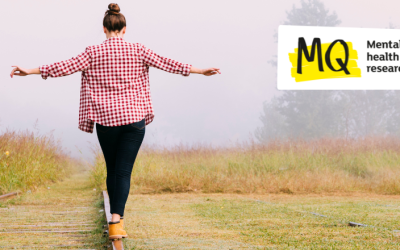Last week, the UK Prime Minister Rishi Sunak announced plans to review the fit note system for people who aren’t well enough to work, with a focus on mental health. His speech given on 19 April 2024 continued a rhetoric from the Conservative party regarding mental...
Anxiety Disorder
10 million
people in the UK are affected
15%
of those with mixed anxiety and depressive disorder are receiving treatment
21 pence
is spent on research each year for every person affected in the UK
Related Conditions:
What is Anxiety Disorder?
Anxiety is a normal emotion, it’s our brain’s way of reacting to stress and alerting us when we are in danger. However, when regular, and excessive anxiety and fear overwhelm us to the point where it interferes with our ability to cope with everyday tasks, this could be considered as an anxiety disorder. Anxiety disorders are the most common mental health disorder.
There are several types of anxiety disorders, characterized not only by distressing, persistent anxiety but often by the dysfunctional behaviors that reduce that anxiety. Examples of anxiety disorders are:
- General Anxiety Disorder: Having regular or uncontrollable worries about many different things in your everyday life. Typically, these symptoms would be present for at least six months.
- Social Anxiety Disorder: Extreme anxiety triggered by any social situation. This includes workplaces, interactions, and parties.
- Panic Disorders: Having regular panic attacks without a clear trigger.
- Phobias: An excessive fear or anxiety triggered by a particular situation or object.
What are the signs and symptoms?
Anxiety feels different for everyone. Some might experience physical effects on their body whilst others might experience anxiety which affects their minds.
The brain and body and closely interrelated such that feelings of fear and anxiety trigger the hypothalamus in the brain to stimulate the release of hormones in our bodies which, in turn produces the ‘fight-or-flight’ response, the physical symptoms.
Though this is not an exhaustive list, these are common symptoms/experiences you may have:
Psychological symptoms:
- The presence of excessive anxiety and worry about a variety of topics, events, or activities. Worry occurs more often than not for at least 6 months and is clearly excessive.
- The worry is experienced as very challenging to control.
- The anxiety and worry may also affect cognitive functions such as edginess or restlessness, impaired concentration or feeling as though the mind goes blank, irritability.
Anxiety can feel like a spotlight in your mind shining on your deepest fears or worries at all times.
Physical symptoms:
- Difficulty sleeping (trouble falling asleep or staying asleep, restlessness at night, or unsatisfying sleep)
- Increased muscle aches or soreness, tiring easily
- Dizziness
- Palpitations
- Shortness of breath
- Abdominal discomfort
What are the causes of anxiety disorders?
Because many factors can increase the chance of developing an anxiety disorder, everyone’s experience of anxiety will be different. It is thought that there is no single cause, but several factors interact to increase your chance of developing an anxiety disorder:
Genetically inherited:
Research shows that having a close relative with anxiety problems might increase your chances of having anxiety problems yourself.
Past or childhood experiences:
Common triggers for anxiety problems are related to difficult experiences in childhood as experiencing extreme stress and trauma can have a big impact. Experiences such as:
- Physical or Emotional abuse
- Neglect
- Losing a parent
- Being bullied or being socially excluded
Current Life Situation:
- Stress such as work pressure, living up to expectations
- Poor living situations such as homelessness or money problems
- Traumatic events such as bereavement, being abused or harassed, experiencing natural disasters (See also PTSD)
Physical or Mental Health problems
Anxiety triggers can be caused by chronic illness or mental health problems such as depression.
Drugs and Medication
Anxiety can, in some cases, be a side effect of certain medications. Recreational drugs and alcohol can also increase anxiety.
What are the common treatments for anxiety disorders?
Anxiety disorders can be treated in a number of ways. Many people have symptoms associated with stressful life events or situations, which can improve without the need for treatment. For those who fulfil an anxiety disorder diagnosis - in terms of severity, duration, distress, and impairment - some form of treatment is likely to be beneficial.
There is strong evidence that psychological and pharmacological treatments are effective for treating many anxiety disorders. Self-help and complementary approaches may help with mild anxiety and can also assist whilst undergoing other forms of therapy. (See also BAP Guidelines)
Psychological and Pharmacological therapies
Psychological - Talking therapies:
- Cognitive Behavioural Therapy (CBT)– Therapy that specialises in your thoughts, feelings and teaches you coping mechanisms to deal with your anxiety.
Pharmacological therapies - Medication:
- Antidepressant: Selective Serotonin Uptake Inhibitors (SSRI) and Selective Serotonin -Noradrenaline Inhibitors (SNRI). These drugs are generally well-tolerated and often the first-line medication. Some side effects may occur but there are many options to find the most beneficial treatment.
- Pregabalin: Anti-seizure drug which normally used to treat epilepsy can also be used to treat anxiety.
- Beta-Blockers: Used to treat physical symptoms e.g. rapid heartbeat, palpitations and tremors (shaking). This does not reduce psychological symptoms.
- Benzodiazepines: Generally reserved for anxiety not affected by other treatments. Can cause sedation and can be addictive so doctors mainly prescribe them for a short period of time.
Self-help and complementary approaches:
There are different ways that can help with anxiety.
Talking to someone
Good stress relief just may involve having someone listen to you without judgement. Samaritans or Anxiety UK are helplines that can support you when you’re going through anxiety.
Support communities also help and may make you feel less alone. Finding people who experience the same disorder can also help and offer great advice. Support groups such as:
- No More Panic
- Triumph Over Phobia UK
- Join Side by Side, Mind’s supportive community
Manage your anxiety and worries
Giving a dedicated time and safe place to worry can provide reassurance. This may involve writing down your worries, meditating and breathing exercises to relieve your worries.
Look after your physical health
As researchers have shown physical problems can sometimes trigger anxiety. Make sure to look after yourself by considering your sleep, diet and exercise.
Breathing exercises for stress and relaxation
For more information on breathing exercises and techniques. (See webmd)
Yoga
Several studies have shown that yoga may help reduce stress and anxiety as it can enhance your mood and oversee a sense of well-being.
Meditation or Relaxation
Meditation may help you learn to be more mindful and aware of the present moment without judgement.
Aromatherapy, Massages, Reflexology
These services may help improve the health of the body, mind and spirit.
Herbal remedies
There is some evidence for the potential effectiveness of herbal remedies such as Passiflora species extracts and Kava.
What help and resources are available for people who need support or further advice?
Information and advice:
By gaining a better understanding of Anxiety Disorder, recognising more symptoms and signs as well as gaining more access to services and supports. You will gain the right support and help necessary for you.
- Anxiety Care UK, Anxiety UK (See here)
- NICE - National Insurance for Health and Care (See here)
Treatment:
Treatment will provide you with the right support and help you cope with your anxiety. It is vital to reach out for help if you think you have symptoms of an anxiety disorder.
- Visit GP: They will do an assessment together you can decide together what might suit you.
- Mind (See here)
- Local Minds (See here)
- British Association for Counselling and Psychotherapy (See here)
Support groups:
Support groups help you through your anxiety disorder, they help you feel less alone, you could offer and receive advice from people who are experiencing the same disorder.
- Side by Side (See here)
- Samaritans (See here)
- Anxiety UK (See here)
What are the recent developments in research for anxiety disorders?
MQ funds a number of different studies that cover anxiety disorders. Here are some of the recent findings:
Sex Hormones and Fear Inhibition: A novel exploration of why women are so vulnerable to anxiety disorders.
Dr Bronwyn Graham investigates the relationship between hormones and anxiety and to find out if natural variations in hormones such as oestrogen make anxiety more likely. Find out more.
Developing more accessible evidence-based psychological treatments for pathological worry and rumination in generalised anxiety and disorders.
Dr Colette Hirsch and her team developed a treatment called Cognitive Bias Modification for interpretation. In ten 25-minute sessions, participants with anxiety were presented with situations that could be interpreted negatively or positively. They were given repeated training to interpret situations more positively, helping to overcome the negative thinking habits of RNT. Find out more.
Youth Depression & Anxiety during and after the COVID-19 pandemic:
Dr Katherine Young investigates and monitors how symptoms of anxiety and depression change in young people over a period of 2 years and examines whether these changes can be used to predict those who will go on to experience long-term issues. Find out more.
Want to see more of our mental health research? See how our world-class researchers are working tirelessly to better understand, diagnose and treat mental illness.
Enjoying this insight? Want to see more like it?
By funding research we can transform what it means to experience anxiety, advancing treatments and improving the lives of millions of people.
Our research into anxiety disorders

Adapting and testing an integrated care model for treatment of Type 1 diabetes and mental health co-morbidities
People with Type 1 diabetes are at a higher risk of developing depression, anxiety, and early mortality. Can an existing care model be adapted to help? More about this project

DATAMIND
The DATAMIND platform is a UK-wide mental health data research hub that will transform mental health research. More about this project

Sex hormones and fear inhibition: A novel exploration of why women are so vulnerable to anxiety disorders
Do natural variations in hormones, such as oestrogen, make anxiety disorders more likely? If so does this affect the way people respond to treatment? More about this project
Related Posts
Tributes to Lea Milligan, MQ’s CEO
It is with great sadness that we announce the death of MQ’s CEO Lea Milligan who passed away following a sudden illness on Monday the 15th of April. Lea dedicated his life to helping other people. He turned down a place at Oxford University, deciding instead to launch...
How Stress Can Affect Mental Health
This Stress Awareness month, we’re considering how stress affects people differently and what to look for if you’re stressed. Although stress is not a mental illness, it can be the cause of, and the symptom of one. Some people are more responsive to stressful...
Read next
View our research projects
Read more about different mental health conditions
Our research projects
Explore how our world-class researchers are working tirelessly to tackle mental illness.
View our research projects
Mental health conditions
Learn more about different mental health conditions, and the research we're doing to transform the lives of those affected by them.
Read more about different mental health conditions
Take part in research
How you can get involved in mental health research.


